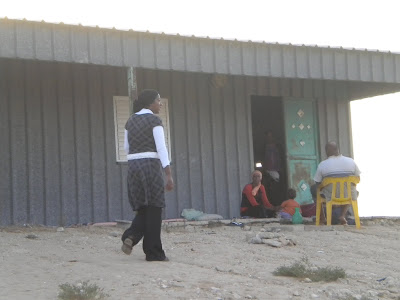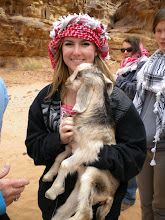
Yesterday Jiries and I went to Be’er Sheva to visit Amal, an amazing Bedouin woman who lives in a Bedouin village, Shegev Shalom, which is organized and “recognized” by the state of Israel. The Bedouins are the original nomadic Arab tribes who have lived in the desert for thousands of years. They have a unique and ancient culture that has been preserved over time but is now in danger because the Israeli government has demolished many of their villages and forced the people to move into designated reservation-like housing areas (kind of like the Native Americans) which are “recognized” by the state. Not only are they evacuated from their own land, but they have to PAY for property and a home in the designated areas that they are FORCED into. All other Bedouin villages are subsequently “unrecognized” and therefore denied electricity and water access, deemed illegal, and susceptible to demolition at any given time. Israel actually has a list of 42 villages it plans on destroying. Why? Because that’s Jewish land; God said so.
This week an editorial in the Israeli moderate newspaper Haaretz (http://www.haaretz.com/print-edition/opinion/displacing-the-bedouin-1.306645) included interesting information and an insightful perspective on the displacement of the Bedouins. The following is the first paragraph, and if you are interested I recommend reading the rest:
“Twice last week employees of the Israel Lands Administration, with the help of a large police contingent, demolished the homes of around 300 residents in the unrecognized Bedouin village of Al-Arakib in the Negev. Most of them, citizens of the State of Israel, including many children, were left not only without homes, but humiliated, frustrated and shocked. Both times the police were brutal, and neither time did the state offer an alternative, compensation or assistance, either material or psychological, for the people whose village was demolished and world was destroyed. That's how a country treats its citizens.”
The “unrecognized” villages are scattered all over the Negev Desert. What’s amazing is how much open land stretches behind them as far as the eye can see. It makes me wonder why Israel feels it is necessary to flatten small clusters of tents filled with families instead of just avoiding them.


You can see the power plant right next to the village, yet they are denied access to electricity:

Amal has come to the United States before to speak at the First Congregational Church of Old Lyme’s annual Tree of Life Conference, which brings together both Israeli and Palestinian voices of conscience working towards a peaceful resolution, and the Tree of Life Journey to the Middle East visited her in Be’er Sheva just last March. After resisting years of societal pressure while growing up, Amal formed an organization called “Bedouin Women for Themselves” and with the help of the FCCOL she has successfully opened several schools for women and supported a variety of women’s initiatives.
We waited until the afternoon so it wouldn’t be as brutally hot as it is during the day, since Be’er Sheva is in the middle of the desert in southern Israel. We arrived around 5 p.m. Israeli time to what Jiries calls Amal’s “civilized” home (it is not a tent). It was only a few minutes after 5, but Amal and her sisters-in-law were already preparing for dinner at 7:30. Since her family is Muslim they have been fasting each day for Ramadan, the Islamic holy month.
 They don’t eat or drink anything, not even water, between 5 a.m. and sunset, around 7:30 p.m. (side note: the Christians here are generally very respectful of the fasting month, Jiries’ sister Violette works with all Muslims in an office in Ramallah and she said she fasts throughout the day with them; along the same lines I spoke with a Muslim woman who joined the PWLS during the American delegation week and she said that her Christian neighbors refrain from cooking outside or making strong-smelling food). Jiries and I sat with 2 of Amal’s cousins and talked to them for awhile about Ramadan and other things, and then Amal came in the dining room to get me. She brought me into the back yard where her mother was sleeping on a blanket on the ground, the children were playing, and the other women were cooking under a large tent.
They don’t eat or drink anything, not even water, between 5 a.m. and sunset, around 7:30 p.m. (side note: the Christians here are generally very respectful of the fasting month, Jiries’ sister Violette works with all Muslims in an office in Ramallah and she said she fasts throughout the day with them; along the same lines I spoke with a Muslim woman who joined the PWLS during the American delegation week and she said that her Christian neighbors refrain from cooking outside or making strong-smelling food). Jiries and I sat with 2 of Amal’s cousins and talked to them for awhile about Ramadan and other things, and then Amal came in the dining room to get me. She brought me into the back yard where her mother was sleeping on a blanket on the ground, the children were playing, and the other women were cooking under a large tent. 







I met everyone outside; the women showed me what they were cooking and the kids chased me around. Everyone spoke only in Arabic to me and I understood about three quarters of it, which I am really excited about. My Arabic is coming along well (according to Jiries), when I sit and listen to a conversation other people are having I generally know what they are talking about, but when people are talking directly to me it is more difficult, especially when they speak quickly, because it takes me a few seconds to figure out all the conjugations and vocabulary in my head. One of Amal’s sister-in-laws actually thought I spoke Arabic for most of the afternoon, and it wasn’t until halfway through dinner that she figured out that I am still learning.
66
67
While waiting for dinner Amal, Jiries and I drove the Tank to Wadi Naim, the village that the Tree of Life Journey visited in March. We had to drive quite a ways on the rocky dirt path until we reached the site where one of Amal’s schools used to be. Along with several homes in the village, it was recently demolished by the Israelis and all that is left of the school is a heap of stones, and where the homes once where there is literally nothing at all.


The site where a mosque used to be before it was destroyed:

We drove a little bit farther until we arrived at Amal’s other school in Wadi Naim. We visited Abu Yousef, the village elder and musician. This year he hosted the Tree of Life trip and next year in 2011 he will be hosting the group again, but this time overnight in the Bedouin tents!




The Tree of Life trip also visited Amal’s school in Wadi Naim for its grand opening in March. Since it is Ramadan now schools are not in session, so the building is presently being used as a shelter for those left homeless because their homes have been demolished.


Homeless baby:







After spending some time in Wadi Naim with Abu Yousef, we headed back to Amal’s house for dinner. Instead of going the way we came, we drove through the desert; it is really amazing how much open land there is.
 Jiries’ car barely made it over the rocks and sand, but eventually we reached the main road. We arrived at Amal’s house just in time for dinner to begin; we had delicious rice with lots of spices and vegetables with chicken with cucumber and tomato salad. After dinner we sat in chairs around a small table outside and talked about different things and ate fruit for dessert. A few of the girls took me to one of the schools that Amal is in charge of just down the road. It is complete with several classrooms and a computer lab.
Jiries’ car barely made it over the rocks and sand, but eventually we reached the main road. We arrived at Amal’s house just in time for dinner to begin; we had delicious rice with lots of spices and vegetables with chicken with cucumber and tomato salad. After dinner we sat in chairs around a small table outside and talked about different things and ate fruit for dessert. A few of the girls took me to one of the schools that Amal is in charge of just down the road. It is complete with several classrooms and a computer lab.




After sitting outside for a while we left to go visit the studio of a female Bedouin artist named Zenab who Amal went to school with. Both of them broke the Bedouin norm of only attending school up until sixth grade and then preparing for marriage- instead, they rebelled and stayed in school all the way up through university. Now Zenab has her own studio and gallery where she creates traditional Bedouin art and sells it. Her store was really cute with lots of beautiful handcrafts, and she and her husband were very welcoming. They gave us drinks and ktayiff, a celebratory Ramadan pastry that is roughly a pancake wrapped around nuts or cheese and soaked in honey, they are so delicious.




After that we dropped Amal off at home and then headed back to Beit Sahour. I drove halfway home! The roads here are insane.
Today was a sad day. I found out one of the women from Tata Huda’s senior citizen center died yesterday at the center right after lunch. Her name was Hind, and her parents lived in Canada at one point so she spent time there and spoke English fluently. Every time I went to Tata Huda’s university Hind helped me with my Arabic and the other day we spent a few hours playing a game she taught me. She showed me pictures of her and her family when she was young and one time when she found out I had never had the spice zatar she brought in a zatar sandwich for me the next day. I was, and still am, very sad to hear that she has passed away.
Other sad news, we had to give Jasmine (the puppy) away because she was barking too loud and too much at night and it was disturbing the neighbors, who get up at 4 or 5 each morning for work. Since Jiries labored for days building her a large pen in the yard we are going to fill it with chickens instead, and one rooster. Tata Huda is really happy because she was not keen on the dog at all. In fact, no one was, and while we had her no one came to visit us. I am sure things will go back to normal now, but I am still bummed she had to go.
However, the positive part of today was going to Rawan’s to see the one week celebration of her babies’ birth. It was a neat tradition that I am glad I got to see, and I took lots of pictures that I will put up within the next couple days with a better explanation. It has been so unbearably hot here it is difficult to really do anything in the middle of the day. Tomorrow Jiries and I are going to go to a pool after I go to the Wildlife Society in the morning, I can’t wait.


No comments:
Post a Comment